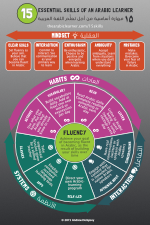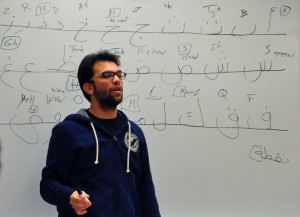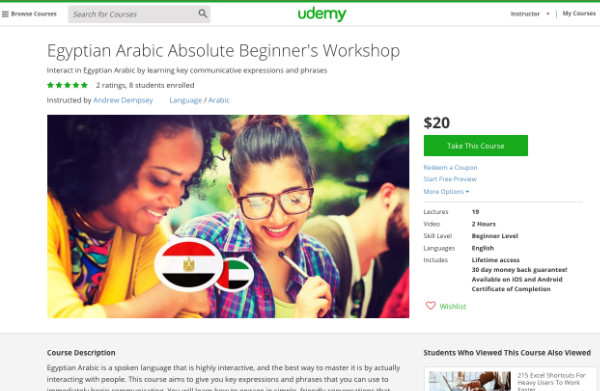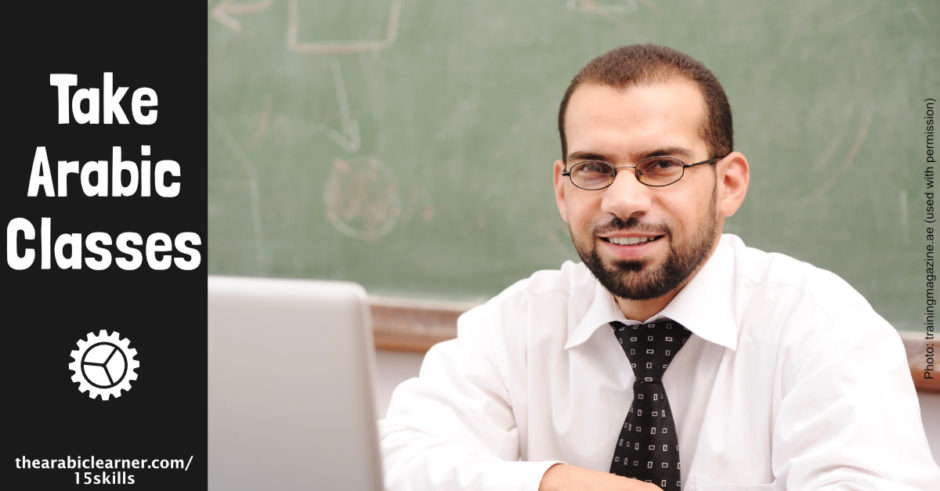Arabic classes – how to choose what works for you
 Take organized Arabic classes given by a skilled instructor, in order to be able to follow a learning curriculum that has been set by someone who has experience in facilitating Arabic language learning. Classes provide a framework that can dramatically accelerate your progress in all areas of Arabic. They also provide feedback and evaluation, which are essential to prevent the recurring mistakes we make from becoming a permanent part of our language (a process known as “fossilization”). These classes can be in person or online.
Take organized Arabic classes given by a skilled instructor, in order to be able to follow a learning curriculum that has been set by someone who has experience in facilitating Arabic language learning. Classes provide a framework that can dramatically accelerate your progress in all areas of Arabic. They also provide feedback and evaluation, which are essential to prevent the recurring mistakes we make from becoming a permanent part of our language (a process known as “fossilization”). These classes can be in person or online.
“In class they are going to show you why it works this way, or why it shouldn’t work this way but perhaps does…” (David Wilmsen)
This article is based on the 15 Essential Skills of an Arabic Learner.
Experiencing Arabic classes
Over the past months I have been writing about mindsets and daily habits that can help you become a more effective Arabic learner. This week I will shift gears into the next section of the 15 Skills of an effective Arabic Learner, and begin to look at organized Systems that can help you learn more effectively.
Perhaps the most common system that we think of, when it comes to learning any language, is the classroom.
In a best-case scenario, a classroom provides:
- a set of objectives and a framework for your learning that lets you make systematic progress toward your Arabic goals
- a skilled teacher who knows the obstacles and hurdles that you will face at given points along the way
- immediate feedback on your Arabic that is friendly and gentle, making you feel empowered to improve
- ongoing evaluation of your overall progress that is clear and encouraging
- an experience that is centered on you and your fellow students
- all of this in an environment that is enjoyable, not stressful, and worth the financial investment you have made
If your Arabic class provides you with all of these things, please stop reading this blog post right now and take a minute to write a thank you note to your teacher. Then continue reading.
If your current experience does not match this, then you are in the same situation as many learners who take Arabic classes. Unfortunately, although we all hope to have good class experiences, it doesn’t always work out that way.
 One of the topics that comes up often on Arabic learning forums (such as my favorite, the learn_arabic subreddit) is what online or in-class courses and programs people recommend, and what are the strengths and weaknesses of each. I will attempt, in the following paragraphs, to give a framework which can help you evaluate a wide range of Arabic classes and make choices based on what will help you achieve the goals that you have for Arabic.
One of the topics that comes up often on Arabic learning forums (such as my favorite, the learn_arabic subreddit) is what online or in-class courses and programs people recommend, and what are the strengths and weaknesses of each. I will attempt, in the following paragraphs, to give a framework which can help you evaluate a wide range of Arabic classes and make choices based on what will help you achieve the goals that you have for Arabic.
Goals of the class
What are your goals for learning Arabic? In what contexts and in what type of situations do you aim to interact in Arabic? Your choice of Arabic classes can and should vary depending on how you answer this question.
A typical goal for most US university Arabic programs would be to interact with Arabic speakers in the modern world[1]. Other western countries would likely have similar goals for Arabic classes in their universities. But this only represents a small cross-section of Arabic learners.
Some of the common goals of Arabic learners that I hear from people on this blog include:
- Being able to interact with Arabic speakers in the modern world
- Being able to speak with my family
- Being able to read and understand the Qur’an, or other religious texts
- Being able to understand Arabic media and documents
- Being able to survive and thrive while living in an Arabic-speaking setting
Some important thoughts to consider when you are looking at your own goals for Arabic classes include:
- Do you plan to use your Arabic in a specific place or with a specific subset of dialect speakers in the Arabic speaking world? If yes, you may want to consider a class that focuses on a dialect such as Egyptian Arabic or Levant Arabic. If not, your needs might be best met by studying Modern Standard Arabic (MSA).
- Do you need to focus primarily on reading and writing, or listening and speaking? Or a combination of both? For Modern Standard Arabic (MSA), you may want to choose a program that emphasizes either one or the other, or a program that keeps them in balance. For dialects, you will find that most classes focus on listening and speaking, since dialects are not normally used for writing (although social media may be catalyzing a shift in this… more on that thought in a future post).
- Is there a specific content focus that you need? Some examples might include things such as Quranic Arabic, “survival Arabic”, historic texts, media Arabic, etc.
Once you know what your goals are, you will be able to look in a more informed and purposeful way at what your class options may be.
In many cases, it may be advantageous to have a program that combines some of these aspects together. For example, when it comes to the question of MSA vs. colloquial Arabic classes, some thought-leaders in Arabic language instruction feel that it is best to have a combination. For example, when I asked Kristen Brustad about this, her response was:
“… not to separate them but to intermingle them, and to combine them in the classroom and encourage students that when you’re studying outside the classroom, as well, to be doing only one skill at a time is not as effective as doing as many as to do as many as you can at the same time… More colloquial does not mean less fuSHa / فصحى (Modern Standard Arabic), it means more fuSHa / فصحى. They push each other and they help each other, and connect with each other.”[2]
In-person classes, online, or tutor?
Another factor that will effect your decision about Arabic classes is the setting and approach of the class. Will you take in-person classes, online classes, work with a tutor, or some combination of the above?
Your choice may be influenced by some of the following factors:
- Availability of in-person classes in your area
- Level of comfort with a classroom setting
- Ability to focus and progress in a more self-regulated learning environment
- Need to have (or not have) other learners around you
- Budget
In-person Arabic classes
 In-person classes are the traditional approach to learning Arabic, and they bring many advantages. The learner has the ability to interact with the teacher in real time. You also have the stimulus and motivation of being surrounded by other learners, and the benefit of learning from their questions, input, and errors as they process the language just like you do. If you live in a place where in-person classes are offered, there are many advantages to an in-person classroom setting.
In-person classes are the traditional approach to learning Arabic, and they bring many advantages. The learner has the ability to interact with the teacher in real time. You also have the stimulus and motivation of being surrounded by other learners, and the benefit of learning from their questions, input, and errors as they process the language just like you do. If you live in a place where in-person classes are offered, there are many advantages to an in-person classroom setting.
Disadvantages may include class sizes that are too large, different levels of learners placed into the same level, and inflexibility in tailoring the curriculum to your own needs. There is also the logistical challenge of getting to the class at scheduled times. The cost of in-person classes can be challenging in many settings.
Online Arabic classes
 Online classes also have advantages. First and foremost, is that they are available in any location where you have a reasonable internet connection. Location-dependence has traditionally been one of the great limiting factors in accessing Arabic classes, so this is a very significant development. They also allow flexibility in schedule, and reduce travel time getting to and from classes.
Online classes also have advantages. First and foremost, is that they are available in any location where you have a reasonable internet connection. Location-dependence has traditionally been one of the great limiting factors in accessing Arabic classes, so this is a very significant development. They also allow flexibility in schedule, and reduce travel time getting to and from classes.
In most cases, the cost of online classes is less than that of similar quality in-personal classes (when comparing prices, be careful that you are not measuring the cost of a high-quality online course with a lower-quality in-person course, which could make the online course appear to be over-priced).
Online classes may also have greater appeal to some learners based on their learning style. These learners often do better when they are not surrounded by other learners. Online classes allow you to proceed at your own pace, and not be held to the pace of other learners in your class.
The main disadvantage of online Arabic classes is that they do not involve being in a classroom where you have direct access to the teacher and are surrounded by other students. If you are a learner who thrives with lots of human contact, you may find online learning a bit more difficult. Other disadvantages can include technical difficulties based on internet connections or websites going down, and decreased ability to receive the coaching and immediate feedback that an in-person teacher provides.
Tutors and one-on-one teaching
 Many people find tutors helpful. This can include both in-person and online tutors. Advantages of a tutor include the individualized focus and attention that you receive when you are learning. All of the attention of the teacher is focused on you, and the possibility for rapid advancement is there. In-person tutors may be able to travel to your location.
Many people find tutors helpful. This can include both in-person and online tutors. Advantages of a tutor include the individualized focus and attention that you receive when you are learning. All of the attention of the teacher is focused on you, and the possibility for rapid advancement is there. In-person tutors may be able to travel to your location.
One of the greatest advantages of tutors is the flexibility they can provide when it comes to the curriculum. A good tutor can tailor their content, approach, and schedule to optimize your learning experience.
The greatest difficulty that most people face with tutors is price, which is much higher than typical classroom prices, and availability. Good tutors are in high demand. Some people may find that the individual attention of a tutor over the duration of the lesson can be draining mentally or emotionally. Some people may miss the stimulus of having other learners in the class.
I should note here that the best tutors are usually qualified teachers who teach Arabic for a living (which is why they can be expensive). I tend to differentiate between tutors and “language helpers”. Language helpers can be found either in-person or online, and are usually free. They are people who like to help you in your Arabic either out of the goodness of their heart, or often in exchange for you talking with them in your first language. Language helpers can be useful, but generally do not fulfill the role of an organized class.
Combinations of more than one system
Increasingly, learners have the choice of combining more than one system. These systems are not mutually exclusive. So, as you take an in-person course, you may be enrolled online in another course that complements it. As you study online, you may meet with a tutor on a regular basis to reinforce the lessons and to ask questions. Do not feel limited to any single approach. Use the combination that works best with your learning style, budget, and overall situation.
Some learning institutes combine systems. For example, Georgetown University Press provides an online program called Al-Kitaab Arabic Language Program to accompany the Al-Kitaab fii ta’allum al-‘Arabiyya textbook. The textbook is normally used in a classroom setting, whereas the website provides reinforcement and further exercises that can be done individually. The Arabic Academy combines all three approaches. Students work their way through the online curriculum, and as a part of the program they meet on skype with a tutor twice per week. In addition, students are able to join quarterly 10-day intensive class sessions in-person, if they are based in Cairo (or able to come to Cairo).
A good teacher
A key factor in the success of your Arabic classes (whether in-person, online, or in a tutoring situation) is the quality of the teacher.
This seems like a very obvious thing to consider, but often when it comes to Arabic classes, learners may often start by looking at the Arabic proficiency of the instructor rather than their actual teaching skills. In many cases, the primary qualification that is considered when Arabic teachers are being sought is whether or not they are native speakers of Arabic.
 The obvious advantage of having a native Arabic speaker as a teacher is that the input one receives during class is correctly pronounced. However, this advantage has been given more weight than is likely deserved. The concept of the native Arabic speaker as the natural expert on the Arabic language (as opposed to other ethnic background teachers who learn Arabic) can be seen emerging as a cultural ideology as early as the 9th century CE, according to Dr. Kristen Brustad[3], co-author of Al-Kitaab fii ta’allum al-‘Arabiyya.
The obvious advantage of having a native Arabic speaker as a teacher is that the input one receives during class is correctly pronounced. However, this advantage has been given more weight than is likely deserved. The concept of the native Arabic speaker as the natural expert on the Arabic language (as opposed to other ethnic background teachers who learn Arabic) can be seen emerging as a cultural ideology as early as the 9th century CE, according to Dr. Kristen Brustad[3], co-author of Al-Kitaab fii ta’allum al-‘Arabiyya.
Most of the Arabic teaching experts whom I interviewed in 2015 (see 15 Essential Skills of an Arabic Learner for more information about who was interviewed and my conclusions from the interviews) supported the idea that non-native speakers of Arabic can actually be more effective Arabic teachers than native speakers.
According to Dr. David Wilmsen, “the attitude that non-natives speakers have in the classroom is more encouraging. They learned Arabic, they know what is going to cause issues before they happen, and can help when they do.”[4] Dr. Kirk Belnap emphasized that non-native speakers (as teachers) provide students with an example of someone who has excelled at what they (the students) are learning, and that this role model is a key factor in building self-efficacy[5].
Apart from the issue of native speaker vs. non-native speaker, the overall teaching skill of the teacher should be taken into account when considering Arabic classes. Laila Al-Sawi, veteran Arabic teacher at the American University in Cairo, says that Arabic teachers need to continually cultivate strong teaching skills such as having student-centered classrooms, task-based activities, and promoting higher order thinking skills.[6]
Feedback, evaluation, and avoiding fossilization
A question that people sometimes ask me about Arabic classes is whether formal classes are actually needed or not. In this age where there are so many Arabic resources available online, is it not better to just immerse yourself in authentic Arabic materials? With so many Arabic speakers now living in all parts of the world, why not just engage in conversations in Arabic with these people?
The answer to this lies in the important role of feedback and evaluation as we learn languages. As we learn, receiving feedback in our attempts to communicate in the target language is crucial. It allows us to cognitively process our own language production, and improve it. Without feedback, we risk fossilization in our Arabic language. Fossilization can be defined as “the process in which incorrect language becomes a habit and cannot be easily corrected”.
For example, you might learn a form of a verb in Arabic that is not correct but is close enough for listeners to understand your intent. Your listeners may, due to politeness or lack of time, not give you any feedback about this error, feeling no need to do so. With no formalized feedback or evaluation of your Arabic, this error will be undetected by you, and may become a permanent part of your language.
The main safeguard against this is to have teachers who can help you notice your errors, by taking time to correct them. This is more difficult in online classes than in-person classes, since much of the teaching is automated. However, online courses can provide a certain level of this through giving opportunity to students to self-assess based on set criteria.
Choosing the right Arabic classes for you
There is no magical class program that works best for everyone when it comes to learning Arabic (or anything, for that matter). But Arabic classes do have an important role to play in the overall framework of your Arabic learning.
By taking into account the criteria given above, you should be able to evaluate potential choices for Arabic classes (in-person, online, or tutoring), based on your needs.
To summarize, the criteria include:
- What are the goals of the class?
- Modern Standard Arabic
- A dialect
- A special content focus
- What type of classroom situation works best for you?
- In-person
- Online
- Tutoring
- Practical considerations of location or schedule
- Budget
- Who is the teacher and what is their level of skill?
- Does the class provide feedback to you as you engage in Arabic?
What are your criteria?
Do you have other helpful criteria when it comes to choosing Arabic classes? Have you had positive or negative experiences that might be useful to share with others? I would love it if you took a minute to share those in the comments section below.
[1] Personal interview with Dr. Kirk Belnap, 4 June 2015
[2] Personal interview with Dr. Kristen Brustad, 18 May 2015
[3] Personal correspondence with Dr. Kristen Brustad, 9 June 2016, in which she allowed me to preview her as-yet unpublished article “The Iconic Sībawayh”.
[4] Personal interview with Dr. David Wilmsen, 28 April 2015
[5] Personal interview with Dr. Kirk Belnap, 4 June 2015. Self-efficacy refers to an individual’s belief in his or her capacity to execute behaviors necessary to produce specific performance attainments (Bandura, 1977, 1986, 1997)
[6] Personal interview with Laila Al-Sawi, 14 May 2015


 RSS - Posts
RSS - Posts
This website is an excellent resource for English speakers learning Arabic.
Thanks Thomas! I hope it’s helpful for a few people out there.